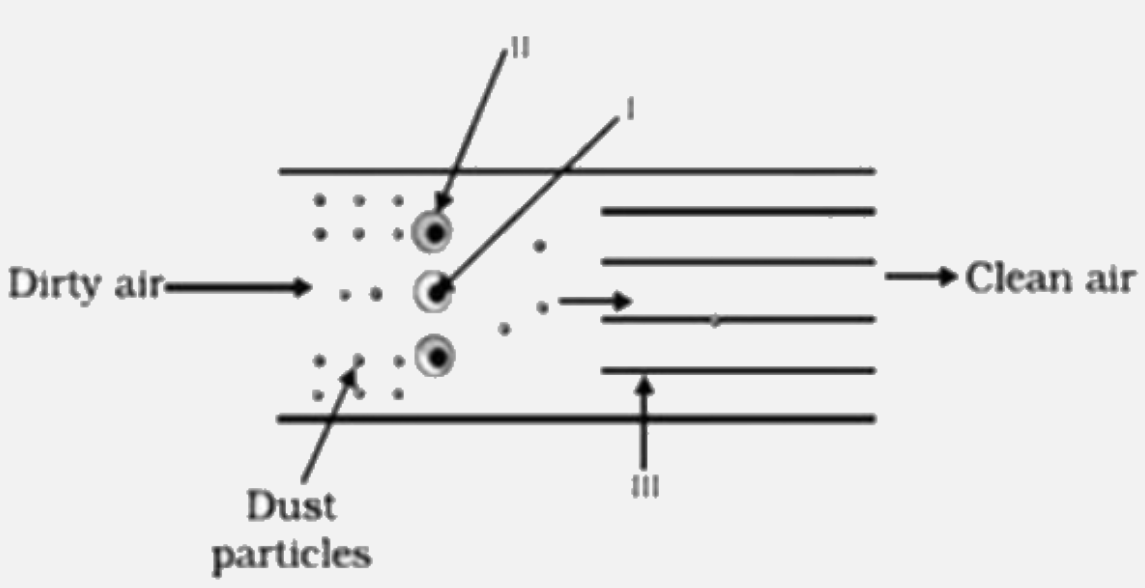Over 99% particulate matter present in the exhaust from thermal power plant can be removed by :-
Scrubber
Electrostatic precipitor
Catalytic converter
lichen
The correct Answer is:B
Step-by-Step Solution:
1. Understanding the Question: The question asks about the method that can remove over 99% of particulate matter from the exhaust of a thermal power plant.
2. Identifying the Options: The options provided are rubber, electrostatic precipitator, catalytic converter, and lichens.
3. Analyzing the Options:
- Rubber: Not relevant for removing particulate matter from exhaust.
- Electrostatic Precipitator: This device is specifically designed to remove particulate matter from exhaust gases.
- Catalytic Converter: Primarily used for converting harmful gases into less harmful emissions, not specifically for particulate matter.
- Lichens: While they can absorb pollutants, they are not a method for removing particulate matter from exhaust.
4. Choosing the Correct Answer: The electrostatic precipitator is the most effective option for removing particulate matter from the exhaust of thermal power plants.
5. Explanation of the Mechanism:
- The electrostatic precipitator uses high-voltage electrode wires (around 12,000 volts) that create a corona discharge.
- This discharge releases electrons that attach to dust particles, giving them a negative charge.
- The negatively charged dust particles are then attracted to grounded collecting plates, effectively removing them from the exhaust.
6. Final Answer: Over 99% of particulate matter present in the exhaust from a thermal power plant can be removed by an electrostatic precipitator.
---
- Rubber: Not relevant for removing particulate matter from exhaust.
- Electrostatic Precipitator: This device is specifically designed to remove particulate matter from exhaust gases.
- Catalytic Converter: Primarily used for converting harmful gases into less harmful emissions, not specifically for particulate matter.
- Lichens: While they can absorb pollutants, they are not a method for removing particulate matter from exhaust.
- The electrostatic precipitator uses high-voltage electrode wires (around 12,000 volts) that create a corona discharge.
- This discharge releases electrons that attach to dust particles, giving them a negative charge.
- The negatively charged dust particles are then attracted to grounded collecting plates, effectively removing them from the exhaust.
Topper's Solved these Questions
- BIOLOGY AT A GLANCEBOOK - ALLENCHAPTER - BIOLOGY AT A GLANCEEXERCISE - Microbes IN Human Welfare And Bio - Technology
32 Videos
- BIODIVERSITY AND CONSERVATIONBOOK - ALLENCHAPTER - BIODIVERSITY AND CONSERVATIONEXERCISE - S
18 Videos
- BIOLOGY AT A GLANCE (ZOOLOGY )BOOK - ALLENCHAPTER - BIOLOGY AT A GLANCE (ZOOLOGY )EXERCISE - EXERCISE
207 Videos
Similar Questions
Which of the following device is used to remove over 99% particulate matter present in the exhaust from a thermal power plant?
1)Electrostatic precipitator
2) Scrubber
3) Catalytic convertor
4) Trajectory separator
View SolutionConsider the following statements with respect to pollution.
A. To control air pollution problems, by the end of 2002 all the buses of Delhi were converted to run on unrelated petrol
B. Electrostatic precipitator can remove over 99% particulated matter present in the exhaust from a thermal power plant.
C. It is possible to estimate the amount of organic matterin sewage water by measuring BOD.
Of the above statements:
View Solution
Knowledge Check
Which of the following is a method used to get rid of particulate matter present in the exhaust from a thermal power plant ?
AMagnetic precipitatorsBChromatographyCElectrostatic precipitatorsDMass spectrometry
Assertion : An electrostatic precipitator (ESP) is a particulate collection device that removes dust and smoke particles from flowing air using the force of an induced electrostatic charge.
Reason : An ESP is a highly efficient device as it removes 99 percent of particulate matter present in the exhaust from a thermal power plant.
View SolutionEffect of thermal power plant is
View SolutionFuel used in thermal power plants is :
View SolutionStudy the diagram given below and mark the INCORRECT statement related to this .

(a) It help in removal of up to 90% particulate matter from exhaust of thermal power plant .
(b) It is negatively changed wire maintained at several thousand volts .
(c) In releases electrons
(d) It is place where dust particles get collected
View SolutionA scrubber in the exhaust of a chemical industrial plant removes:
View SolutionHirudin can be extracted from transgenic plant
View SolutionHirudin can be extracted from transgenic plant
View Solution
